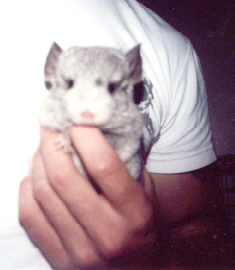| Basics on the health of your pet: Ears: Ears should be smooth and soft. Chinchilla ears need to be cleaned now and then from built up dust or dry skin. I recommend using mineral oil on a dry rag, and gently rubbing it on your chin's ears. The dry skin or dust will come right off. Eyes: Chinchillas should have clear bright eyes. If there is any clouding in the chinchilla's eye(s) at all, please see your vet for glaucoma or possibly cataracts. If there is any discharge coming from your chinchilla's eye(s), have your pet's teeth checked out immediately with x-rays(in case of malloclusion). Other possible causes of the discharge can be the chinchilla has a cold, or eye infection(sometimes caused by dust, but also can be from another chinchilla with a contagious eye infection.). Teeth- Teeth should be even with top to bottom incisors. If you find them diagonal, or overgrown, go to your vet immediately to have your chinchillas teeth trimmed. Chinchillas can starve themselves because of their incisors being too long or uneven. Teeth should also always be a yellow/orange in coloring. If white, your chinchilla could have a calcium deficiency or lack of vitamin c in the diet. Always check the diet you are feeding your chinchilla if it has white teeth. Sometimes white teeth are also found in pregnant or nursing females. Nose- Chinchillas nose should not have any discharge and should be clean and dry. If you find any discharge or hear any wheezing from your pet, go to your vet immediately. Possible concerns are respiratory problems, infections, or cold. Fur- Fur should not have any holes in the coat or be bald in any areas of the body. If there are any holes in their fur coat(dark spots where it is uneven and short compared to rest of coat), your chinchilla is most likely fur chewing. If the case, possible reasons are stress, or hereditary. If stress, please look at things you may have changed in their enviroment or diet recently. That includes cage change, new home, new mate, food, room, etc... If hereditary there is not much you can do, but not breed your pet. 50% of all hereditary fur chewers offsprings, become fur chewers later in life. You won't always find this out until approximately 18-24 months later. If the fur chewer is pregnant or nursing, however, sometimes females will tend to chew their fur from the stress of pregnancy or kits. It usually goes away after the babies are weaned. If there are any bald spots or patches on your chinchilla, sometimes it can be due to slippage. However if the skin in the bald patches is flaky or red, your chinchilla could have fur fungus and best to see your vet for treatment. As well as add a tablespoon of desenex fungal foot powder to your chinchilla's dust bath. Feet: Chinchilla feet should have moisturizer on them if the bottom pads get too dry, too hard, etc... Sometimes it is caused by wire bottom cage floors. If your chinchilla's feet are already like this, you can purchase a product called Protecta-Pad Cream on Chinworld. Genitals: Chinchilla males need to be checked at the very least once a month if they are mating, for hair rings on the penis. To check for this get a pair of tweezer, vaseline, and someone to hold the chinchilla for you. Pull back the sheath of skin over the penis and withdraw the penis fully out. If you find no rings around it, rest assure all is fine. However, if a ring is found, it must be removed immediately. Pull it off gently with the tweezers. Gently put vaseline on it after, so the penis may slowly retract back with no problems. For female chinchillas, they should have no bleeding in the vaginal area, unless after birth or during. If they do have bleeding, sometimes it can be caused from mating. Which will sometimes tear the skin around vaginal opening. If however it does not look to be the case, please check with your vet. Sometimes females will bleed when miscarrying, and sometimes there are much worse complications such as infections inside. If anything seems abnormal from odd colored discharge to urine with a strong smell(as we know chinchilla urine does not smell strong), always go to a vet to check. Sometimes infections can be the reason and best to always make sure and check. Weight : Chinchilla bodies vary in weight from each chin to the next. If you have a kitchen scale or postal scale, please check weekly to make sure your chinchilla is never losing weight. If your chinchilla seems to be sick or such, always check its weight. Which is a great indicator to help you ensure your chinchilla is okay and healthy. Chinchillas rarely will show you they are unhealthy so if you are not aware of or checking your chinchilla for health, they can become ill very quickly. Checking weight is one of the best ways of knowing if your chinchilla is pregnant, eating, gaining (baby chinchillas, or chinchillas that are getting over illness should be weighed to ensure they are doing well), etc... Depending on body size for chinchillas, some chinchillas weigh as little as 450 grams(adult small body chinchillas) to as much as 1000 grams or more. Average weight being around 500-800 grams. Please keep the health of your chinchilla in check at all times. They are your responsibility, and they depend on you to keep them healthy and happy. |
 |